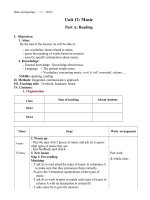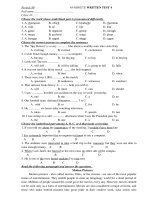GIÁO ÁN TIẾNG ANH LỚP 10 bam sat 10 18
Bạn đang xem bản rút gọn của tài liệu. Xem và tải ngay bản đầy đủ của tài liệu tại đây (90.95 KB, 4 trang )
Date : ………………..
Period : ……..
Self-chosen English 10
REPORTED SPEECH (INDIRECT SPEECH)
I. AIM :
Students are able to review reported speech and use this grammar correctly to solve applying exercise
II. LANGAUGE CONTENT :
1. Grammar : Reported speech
2. Vocabulary : Words appear in the exercise.
III. PROCEDURE :
Teacher’s and Students’
activities
Content
I. WARM UP:
I’m
bored!
- T shows a picture and has Ss
study this example situation:
- Then, T introduces the two
ways to report what someone
said.
- T has Ss compare the
changes in these two
sentences:
- T. leads Ss to the lesson.
-T. tells the use of reported
speech
-T notices Ss. the rule to
change a sentence into
reported speech when the
reporting verbs are in present
and future tense.
- T. gives examples to
illustrate.
- Then, T helps Ss. review
some changes in reported
speech.
-T, sticks a mini board or
Mr. Brown said, “I’m bored”. (direct speech)
Mr. Brown said (that) he was bored. (indirect speech)
said : reporting verb
II. LANGUAGE CONTENT:
1. GRAMMAR:
- Reported speech is used to report the content of a direct speech. When
reporting, we must change these following factors: tenses, personal
pronouns, possessive pronouns, adverbs of time and place,…
- Tenses in the reported speech do not change after the present or future
reporting verbs.
E.x: Hoa says, “I want to go home”.
Hoa says she wants to go home.
- Tenses in the reported speech will change after the past reporting
verbs.
CHANGES IN REPORTED SPEECH
Direct speech
Present simple
Present progressive
Tenses
Reported speech
Past simple
Past progressive
Teacher : Nguyeã n Thò Thu Thuû y
Self-chosen English 10
shows on the screen to
summarize these points:
- T. introduces each type of
reported speech, gives
examples, explains them and
guides Ss. to change
- Ss listen to T’s explanations,
observe on the board and take
notes into their notebooks.
Past simple
Past progressive
Present perfect
Simple future
Must
Have to
Can
May
Past perfect
Past Perfect progressive
Past perfect
Would + verb(bare inf)
Had to
Had to
Could
Might
Adverbs of time and place
Yesterday
The previous day/ the day before
Last week/month/year
The week/ month/ year before
Now
Then
Today
That day
Tonight
That night
Tomorrow
The next day/ the day after
Next week/ month/ year
The week/ month/ year after
Here
There
This
That
These
Those
1. Statement
Direct speech
“ S + V….”
TYPES OF REPORTED SPEECH
They said,“We like
oranges”
Reported speech
S + said + (that) + S +V (change the tense)
+ told +O
They said they liked oranges.
2. Wh-questions
Direct speech
Subject questions:
“Wh-word + V…..?”
She asked, “Who will take
care of the baby?”
Object questions:
“Wh-word + aux + S +
V?”
She asked, “What time
has the film started?”
Note: aux = auxiliary
verb (do, did, does, is,
are, will, can, have….)
Reported speech
S+ asked + O + wh-word + S +
V(change the tense)
She asked me who would take care
of the baby.
S + asked + O+ wh-word + S +
V(change the tense)
She asked me what time the film
had started.
Note: The inversion after a question
word change to statement word
order.
Teacher : Nguyeã n Thò Thu Thuû y
Self-chosen English 10
3. Yes/No questions:
Direct speech
“ Aux + S + V…..?”
He asked, “Are you a teacher?
He asked, “Did you have
breakfast?
Reported speech
S + asked + O + if/whether + S
+ V(change the tense)
He asked me if I was a teacher.
He asked me whether I had
had breakfast
- T. distributes Ss. handouts to 3. PRACTICE:
provide them. with the Exercise 1: Change into reported speech.
1. “ I’ll see you tomorrow,” he said to me
exercise.
2. “ I saw Nam on my way to school yesterday,” she said
3. Mary told me, “ I saw them at this place.”
- T. explains the exercise and
4. “I’m trying to listen to the music,” she said.
guides Ss. to do it.
5. “ I must go out to post this letter now, Mum” he said.
- T. models with one sentence
6. “ I can’t speak any foreign languages,” the man said.
first.
7. Ann asked Mike, “ When will I see you again?”
- Then, T. has Ss. work
8. Laura said to George , “What are you doing?”
individually
to
do
the
9. “ Have you seen John recently?” she asked me.
exercise.
10. “ Does you go to church every Sunday?” Lan asked him.
- T. goes around the class the
check and provide help if Answers:
1. He said to me he would see me the day after.
necessary.
2. She said I had seen Nam on her way to school the day before.
- After some minutes, T calls
3. Mary told me she had seen them at that place.
on some Ss. to write their
4. She said she was trying to listen to the music.
answers on the board.
5. He told his Mum he had to go out to post that letter then.
- T. has other Ss. give
6. The man said he couldn’t speak any foreign languages.
comments and suggest
7. Ann asked Mike when she would see him again.
correction if the sentences are
8. Laura asked George what he was doing.
wrong.
9. She asked me if I had seen John recently.
10. Lan asked him if he went to church every Sunday.
Exercise 2: Choose the correct answer.
1. Charlie said, “ I’m thinking of going to live in Canada.”
- T. explains new words if
a. Charlie said that I was thinking of going to live in Canada.
any.
b. Charlie said that I am thinking of going to live in Canada.
- Ss. work individually and c. Charlie said that he was thinking of going to live in Canada.
then compare their answers d. Charlie said that he is thinking of going to live in Canada.
2. Lan said, “ My father is in hospital.”
with a partner.
a. Lan said that my father is in hospital.
b. Lan said that her father was in hospital.
c. Lan said that her father is in hospital.
- T. goes around the class and d. Lan said that my father was in hospital.
Teacher : Nguyeã n Thò Thu Thuû y
Self-chosen English 10
offers help.
3. Mike said, “ I don’t know what Fred is doing.”
a. Mike said that he doesn’t know what Fred is doing.
- After some minutes, T. asks b. Mike said that he didn’t know what Fred is doing.
some Ss. for their answers.
c. Mike said that he doesn’t know what Fred was doing.
- Ss. give their answers and d. Mike said that he didn’t know what Fred was doing.
explains their choices.
4. “ Are you willing to travel?” she asked me.
a. She asked me am I willing to travel ?
b. She asked me if I am willing to travel.
- T. checks and corrects with c. She asked me was I willing to travel ?
the whole class.
d. She asked me if I was willing to travel.
5. “Where did you go?” she asked me.
a. She asked me where I had gone.
b. She asked me where did you go?
c. She asked me where did I go?
d. She asked me where you had gone.
Answers: 1 – c , 2 – b , 3 – d , 4 – d , 5 – a
III. HOMEWORK :
- Ss. review the today’s lesson.
- Ss. do the exercises again.
Self-evaluation :
………………………………………………………………………………………………………………………………………………………………………………………………………………………
………………………………………………………………………………………………………………………………………………………………………………………………………………………
………………………………………………………………………………………………………………………………………………………………………………………………………………………
………………………………………………………………………………………………………………………………………………………………………………………………………………………
Teacher : Nguyeã n Thò Thu Thuû y









